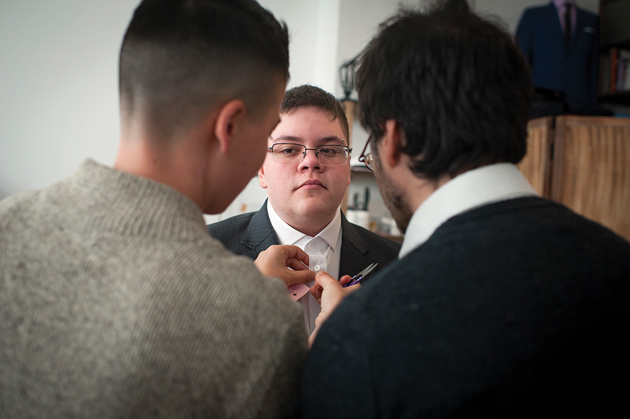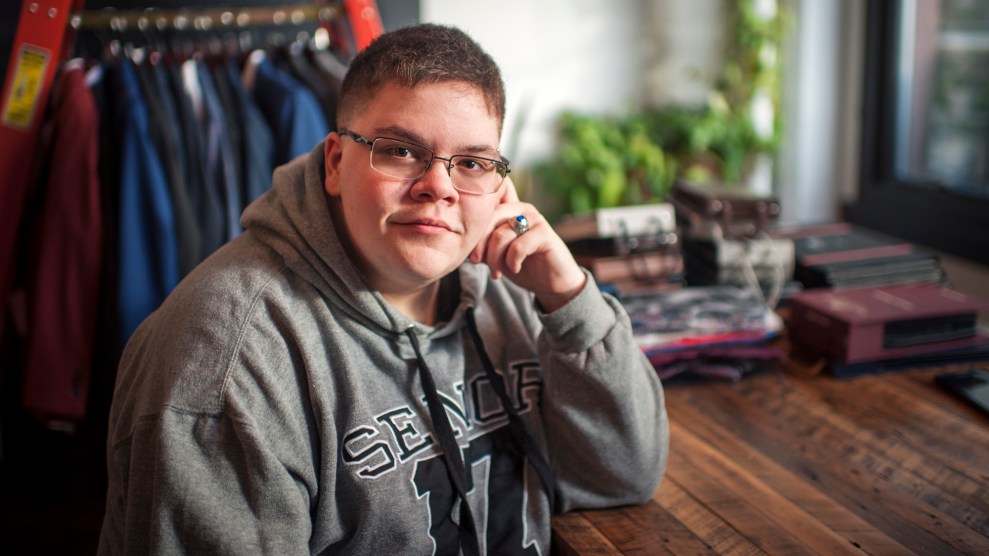
ACLU lawyer Chase StrangioPhotograph by Benedict Evans
At a small tailor shop in Brooklyn, Gavin Grimm emerges from behind a wooden screen in a brand new charcoal-gray suit and fastens the last button on his crisp white dress shirt. Grimm, a 17-year-old transgender high school senior, flew in from his home in rural Virginia for the fitting; he needed new threads to wear to an upcoming Supreme Court hearing. He surveys his reflection in a towering mirror. “It fits,” he says with a smile, noting how the cut of the ensemble hides the curve of his hips and broadens his shoulders.
“It does look really good,” says his lawyer Chase Strangio, who has been poring over documents on a laptop perched atop an ironing board. Strangio is behind some of the biggest recent legal fights for gay and transgender rights: He pushed for marriage equality in Obergefell v. Hodges and is a lead counsel for whistleblower Chelsea Manning, who came out as trans while in military custody. Now he’s part of the American Civil Liberties Union legal team that’s suing to get Grimm access to the boys’ bathroom at his high school.
Grimm’s lawsuit has been hailed as a landmark transgender rights case, and Strangio wants to help the once painfully shy teenager navigate the pressure of being a standard bearer for the cause. The evening before the fitting, he introduced Grimm to Laverne Cox, the Emmy-nominated transgender actress known for her role in Orange Is the New Black. “It’s always a good thing when you stand up for yourself,” she told Grimm.

Strangio is 5-foot-4, with a dark brown mustache, skinny jeans, and a Red Sox hat he regularly adjusts, popping the brim up as he talks. His arms are covered with tattoos—he gets a new one every few months to distract himself from work. The 34-year-old’s colleagues say he’s a brilliant and driven lawyer who always goes the extra mile for his clients. “He’s probably the most passionate advocate I’ve ever worked with,” says Rose Saxe, a fellow ACLU attorney. “It’s because he lives it, too,” says Deirdre Grimm, Gavin’s mom.
Strangio grew up in a Jewish family outside Boston. His dad’s a Trump supporter who gets his news from Breitbart—which once slammed Strangio for his “sick worldview.” As a kid, he struggled with questions about his identity, but it wasn’t until law school that he came out as trans and changed his name to Chase. The harassment escalated soon afterward. One judge poked fun at his boyish appearance, calling him “Doogie Howser” in front of a packed courtroom. “Part of me always felt like an outsider and a freak,” Strangio says.
There are very few transgender lawyers in the United States, says Seattle University’s Dean Spade, the country’s first openly trans law professor. Many gender-nonconforming people drop out of school or don’t pursue higher education because of discrimination or a lack of family support. For a long time, Strangio didn’t like the idea of law school—he saw it as selling out to a system that’s biased against minorities. But a postcollegiate job as a paralegal at an impact litigation group convinced him that lawyers could help people secure immediate needs so they could participate in longer-term fights for equality. After law school, Strangio landed a position working for Spade as a public defender in New York City, juggling 50 or more cases at a time for gender-nonconforming clients.
When he joined the ACLU four years ago, Strangio had just become a father, and he soon had to balance sleepless nights with Manning’s high-profile case. Manning, the Army private sentenced to 35 years in prison for handing over a massive trove of classified military information to WikiLeaks, came out as trans in 2013, on the first day of her sentence. Military doctors recommended that she live and be treated as a woman, but the Army denied her hormone therapy. Strangio sued and got her the treatment in 2015.
Since then, Strangio has become one of Manning’s closest confidants. They talk about the math books she’s reading and lighter topics like Taylor Swift’s Instagram photos. “I’ll watch the Golden Globes and tell her what people were wearing,” Strangio says. “She’s a total millennial.” In January, President Barack Obama commuted Manning’s sentence. She will be released on May 17, and thanks to a fundraiser that Strangio organized, she’ll start out with more than $120,000 to pay for rent, health care, and other expenses.
Strangio is now throwing himself into the fight against so-called bathroom bills, which have proliferated in the last few years. Lawmakers in more than a dozen states—most famously North Carolina—have introduced bills that would require transgender people to use public restrooms corresponding to the sex they were assigned at birth, rather than their gender identity. Schools around the country have also implemented similar policies. A common justification for the measures is the claim that they protect children’s privacy. As one mother explained at a school board meeting about Grimm’s case, “My son has boy parts; he does not want to be in the bathroom with people with girl parts.”

Grimm, who came out as trans during his sophomore year, sued his local school board in 2015 after it required him to use the girls’ room or a private bathroom near the nurse’s office. “I can’t go to the girls’ room because I’m not a girl,” he says. “It’s just very stigmatizing, and it’s embarrassing.”
And illegal, he adds. His lawsuit argues that the school board’s policy violates Title IX, the federal civil rights law that prohibits sex discrimination in public schools. The Obama administration agreed with that interpretation, threatening to pull federal funding from schools that blocked trans kids from their preferred bathrooms. Twenty-three states then sued the administration, saying it had overreached by barring discrimination based on gender identity, rather than sex.
In February, the Trump administration sided with those states, telling schools they could go back to blocking trans kids from bathrooms. Facing Trump’s reversal on Title IX, in March the Supreme Court dropped its plan to hear Grimm’s case, kicking it back to the 4th Circuit Court of Appeals, where it will be reconsidered. Though he graduates in June, Grimm plans to remain a plaintiff.
The case isn’t just about bathrooms, Strangio says, but about the right to have a normal life. He admits that public bathrooms still make him nervous. “If you can’t go to the bathroom, you can’t go to school or have a job,” he says. “You can’t go to the movies or a restaurant. This is really a question of whether or not as a society we’re going to let trans people participate and be part of our social fabric.”
Strangio was waiting to board a train to Washington, DC, when the Supreme Court announced it was punting on Grimm’s case. “Today our momentum was sent on a detour,” he tweeted, “but nothing can stop it. We will fight. We will win.” And he still has plans to keep Grimm in the spotlight: “He expects to be wearing the suit a lot.”














